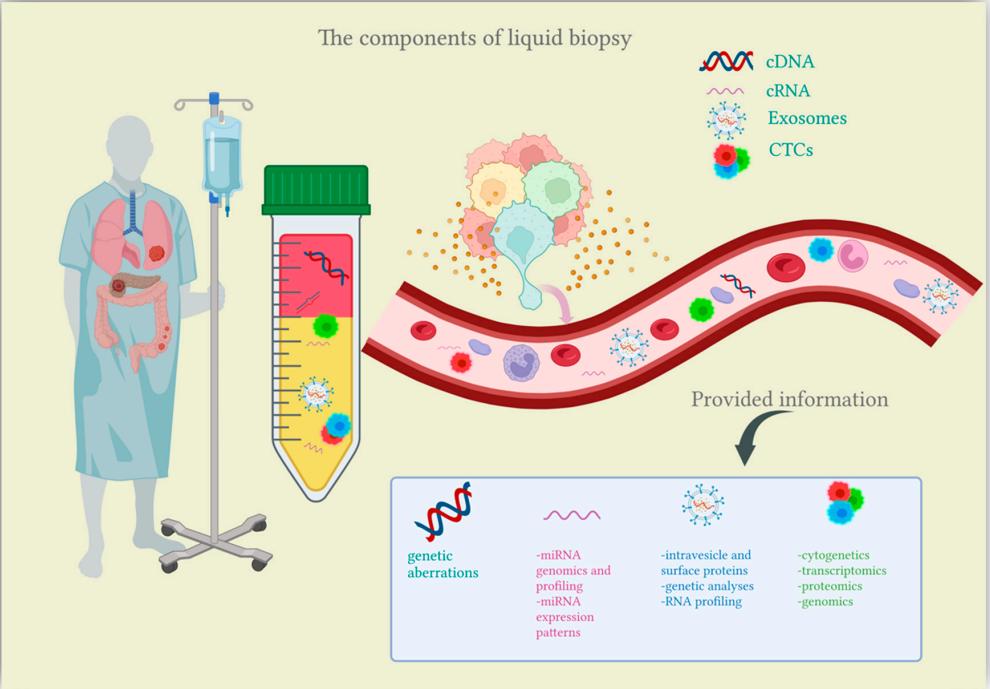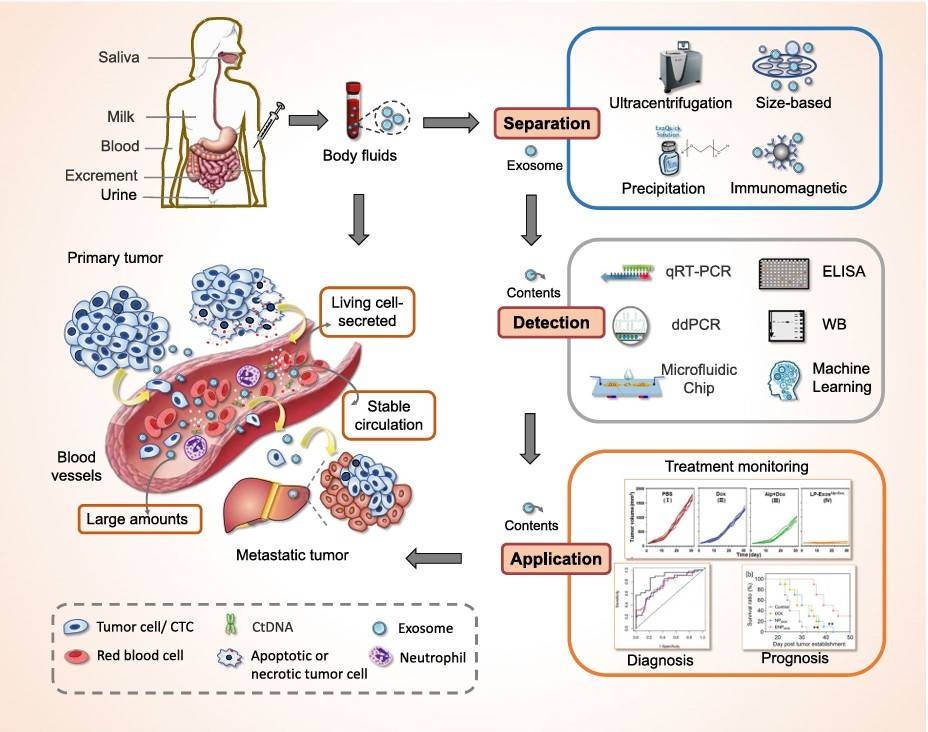Early Tumor Diagnosis-Applied Exosomes
Overview Services Features FAQs
Early tumor screening and accurate diagnosis are the primary key issues to reducing lesion mortality and improving cure rates. Exosomes as biomarkers for liquid biopsy have expanded the new horizon in the field of early tumor diagnosis. Creative Biolabs, with our comprehensive exosome extraction and analysis technology platform, has long been committed to high-precision and high-sensitivity exosome research, helping the research and application of exosomes as biomarkers in early tumor diagnosis.
Early Tumor Diagnosis and Liquid Biopsy
Early tumor diagnosis is an imperative way to detect tumors and pre-tumor lesions. For early oncology diagnosis, the mature technologies involved include both imaging-based technologies such as MRI and CT, as well as continuous monitoring such as wearable devices. However, most of the traditional techniques for diagnosis have limitations in terms of invasive sampling with increased risk of organ lesions and the possibility of infeasibility. Liquid biopsy overcomes this problem as a non-invasive diagnostic technique.
With the maturation of detection technology, the discovery of more biomarkers that respond to tumor pathology based on algorithms that stratify high-risk groups for specific tumors has broadened the application of liquid biopsy in early tumor diagnosis. The easy isolation of exosomes from patient plasma/serum can serve as a new resource for reliable biomarkers in liquid biopsy. The biological basis here is that tumor-derived exosomes regulate the process of genetic information exchange between tumor cells, immune cells, and basal cells, which can promote the remodeling of immune-tolerant complex tumor microenvironment abundant in neovascularization, tumor growth, and invasion. These exosomes released into the blood by tumor cells have a strong correlation with the occurrence, development, metastasis, and drug resistance of the corresponding tumors, which play a role in the future field of precision medicine as markers for early tumor diagnosis.
 Fig.1 The components of liquid biopsy.1, 3
Fig.1 The components of liquid biopsy.1, 3
Exosomes in Early Tumor Diagnosis at Creative Biolabs
-
The first critical step in the application of exosome analysis for early tumor diagnosis is the efficient and convenient preparation of exosome samples. For current exosome isolation and purification technologies, Creative Biolabs is equipped with a variety of exosome purification platforms including ultracentrifugation, size-exclusion chromatography, affinity-based capture, and tangential flow filtration, offering technical advantages such as rapid collection, both purity and yield, and retention of intact morphology and biological activity.
-
Then, histological profiling techniques are adopted for the profiling of exosome samples. For example, the characterization of single exosome surface proteins facilitates the identification of abnormally high expression of tumor-derived exosomes and circulating exosome populations, thus pointing the way to tissue-specific marker screening and early tumor diagnosis-related studies.
-
The multiple forms of RNA contained in exosomes are also valuable diagnostic indicators for early tumor diagnosis. The finding that tumor-released exosomes carry high levels of the miR-122 act to create a soil suitable for tumor metastasis suggests the need to analyze exosomal RNA as an essential indicator in early tumor diagnosis.
Based on rigorous validation procedures and quality control processes, Creative Biolabs can realize reliable and accurate exosome data reporting outputs, advancing the research of exosomes in early tumor diagnosis applications.
 Fig. 2 Exosomes as a new target for liquid biopsy.2, 3
Fig. 2 Exosomes as a new target for liquid biopsy.2, 3
Features of Early Tumor Diagnosis-Applied Exosomes
-
Non-Invasive Detection: Exosome-based diagnostic methods allow for early tumor detection through non-invasive sample collection methods, such as blood or urine tests, reducing the need for invasive biopsies.
-
High Sensitivity and Specificity: Exosomes carry a range of biomarkers, including proteins, RNAs, and lipids, that can be analyzed for high sensitivity and specificity in detecting various types of tumors at an early stage.
-
Early Detection Capability: Exosome analysis can identify tumor-associated changes before the onset of significant symptoms, enabling early intervention and potentially improving patient outcomes.
-
Real-Time Monitoring: The technology allows for continuous monitoring of tumor progression and treatment response, providing valuable insights into the effectiveness of therapeutic strategies.
-
Minimal Sample Volume: Exosome diagnostics require only small volumes of biological fluids, making it a more convenient and less burdensome method for patients compared to traditional diagnostic procedures.
Tumor diagnosis is a physiological examination for common tumors based on tumor risk assessment, which facilitates the estimation of cancer risk and the detection of early lesions for early intervention. Exosomes extracted after non-invasive sampling are promising liquid biopsy biomarkers that can be applied in early tumor diagnosis. With comprehensive histological analysis technologies for exosomal protein, nucleic acid, and cytokine components, Creative Biolabs facilitates protocol development and applied research related to early tumor diagnosis according to the changes occurring in exosomes. Please contact us with your interest.
FAQs
Q: How does exosome-based tumor diagnosis work?
A: Exosome-based diagnosis involves isolating exosomes from patient samples (such as blood or urine) and analyzing their molecular content to identify biomarkers associated with tumors. This may facilitate the early detection of malignant cells.
Q: How does exosome analysis compare to traditional biopsy methods?
A: Exosome analysis offers a less invasive alternative to traditional biopsies, requiring only blood or urine samples rather than tissue samples. Additionally, it can offer ongoing therapy response monitoring and earlier tumor diagnosis.
Q: Are there any risks associated with exosome-based diagnostics?
A: Exosome-based diagnostics are generally considered safe, as they involve non-invasive sample collection methods. Still, there can be restrictions on sensitivity and specificity, just like with any medical test.
Q: Can exosome analysis be used for all stages of cancer?
A: Exosome analysis is particularly valuable for early detection and monitoring. However, its effectiveness in advanced stages of cancer and its role in comprehensive cancer care are areas of ongoing research.
References
-
Galoș, Diana, et al. "Clinical applications of liquid biopsy in colorectal cancer screening: current challenges and future perspectives." Cells 11.21 (2022): 3493.
-
Yu, Dan, et al. "Exosomes as a new frontier of cancer liquid biopsy." Molecular cancer 21.1 (2022): 56.
-
Under Open Access license CC BY 4.0. The image was modified by revising the title.
For Research Use Only. Cannot be used by patients.
Related Services:

 Fig.1 The components of liquid biopsy.1, 3
Fig.1 The components of liquid biopsy.1, 3
 Fig. 2 Exosomes as a new target for liquid biopsy.2, 3
Fig. 2 Exosomes as a new target for liquid biopsy.2, 3








